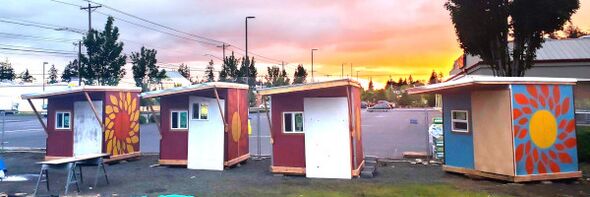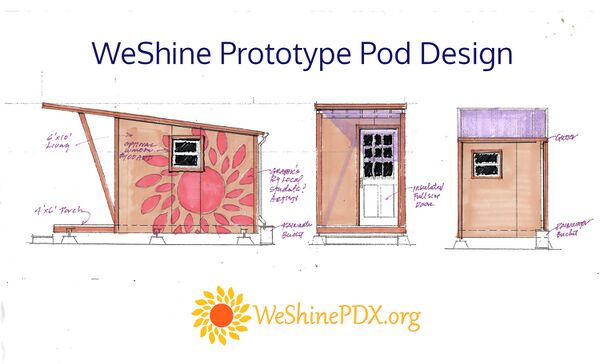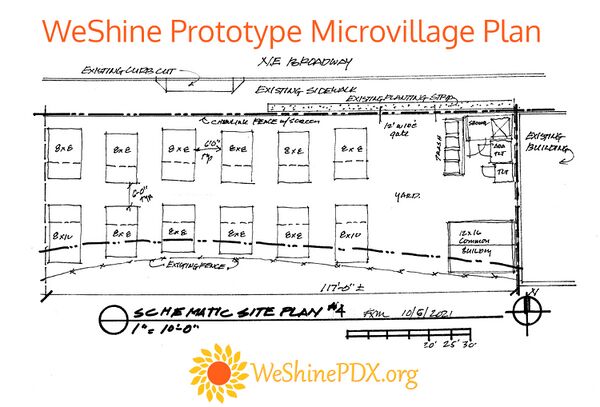Parkrose Community Village
| Parkrose Community Village | |
 Parkrose Community Village | |
| Team Organizations | WeShine |
| Point of Contact | Janet McManus |
| Participating Municipalities | Portland OR |
| Sectors | Buildings |
| Initiative | |
| Status | Development |
| Last Updated | February 1, 2026 |
Summary
WeShine’s first micro-village. Micro-villages are “transitional shelters”, designed to provide safety, privacy, hygiene, and community to people seeking permanent housing. PCV will include paid staff, lockable sleeping pods, laundry, showers, toilets, fencing, and a community building. Volunteers will help with art, gardening, financial literacy, food, pet care, and medical/nursing needs.
Overview of WeShine’s Parkrose Community Village 6/30/2022
Parkrose Community Village (PCV) is WeShine’s first micro-village. Micro villages are “transitional shelters”, designed to provide safety, privacy, hygiene, and community to people seeking permanent housing. PCV will include paid staff, lockable sleeping pods, laundry, showers, toilets, fencing, and a community building. Volunteers will help with art, gardening, financial literacy, food, pet care, and medical/nursing needs.
WeShine guests are found by referral, complete an application process, set personal goals and success measures, and must sign a Good Guest Agreement that addresses behavior expectations. WeShine has also developed a Good Neighbor Agreement with input from with local business owners, neighborhood associations and watch groups, the Joint Office of Homeless Services, the Parkrose Community United Church of Christ, and others.
The Parkrose Community Village will serve adults who identify as LGBTQIA+, with a priority for those who are also Black, Indigenous, or People of Color or who have been camping nearby. The Parkrose Community Village does not accept children or minors.
The Village will not be a magnet for RVs and other campers. Guests and volunteers will walk the area, do outreach, and encourage nearby campers to move. No RVs or other campers will be allowed to stay on church property. Only authorized visitors are allowed in the village.
Micro-villages reduce the harm of drug and alcohol use. Low Barrier does NOT mean accepting all behaviors. Guests at a WeShine village are held accountable for their behavior, and could be asked to leave if they do not meet agreed-upon expectations. Alcohol and illegal drugs are used only within the privacy of a guest’s pod.
PCV will not add to neighborhood violence. Violence by and among guests is not tolerated. All have signed the Good Guest Agreement, and will participate in maintaining the village’s security, safety, and cleanliness as well as that of the church property. Staff are skilled in de-escalation and crisis intervention.
WeShine micro-village is a temporary outdoor shelter. PCV has a two-year lease and funding and will undergo the city’s annual permit renewal process. WeShine hopes that, over several years, micro village-style transitional shelters, in conjunction with other types of shelter,will help those on Portland’s streets move into permanent housing, and contribute to asubstantial reduction in the region’s unmanaged encampments.
Neighbors are encouraged to meet guests and staff and join Weshine as a volunteer. Many neighbors have attended WeShine meetings. Contact WeShine’s Executive Director and Program Manager at pcv@weshinepdx.org about opportunities.

